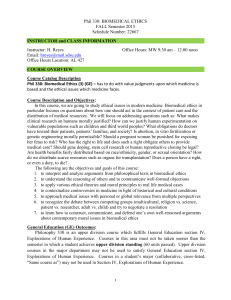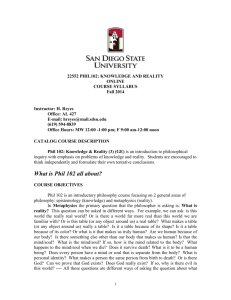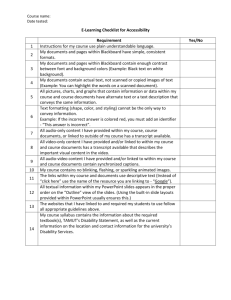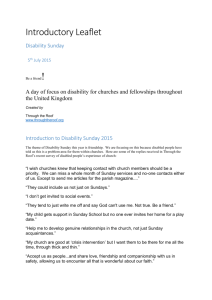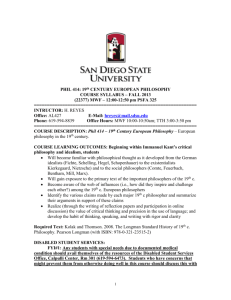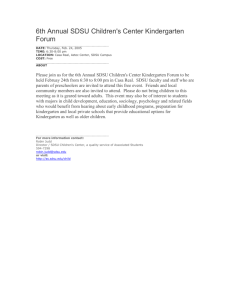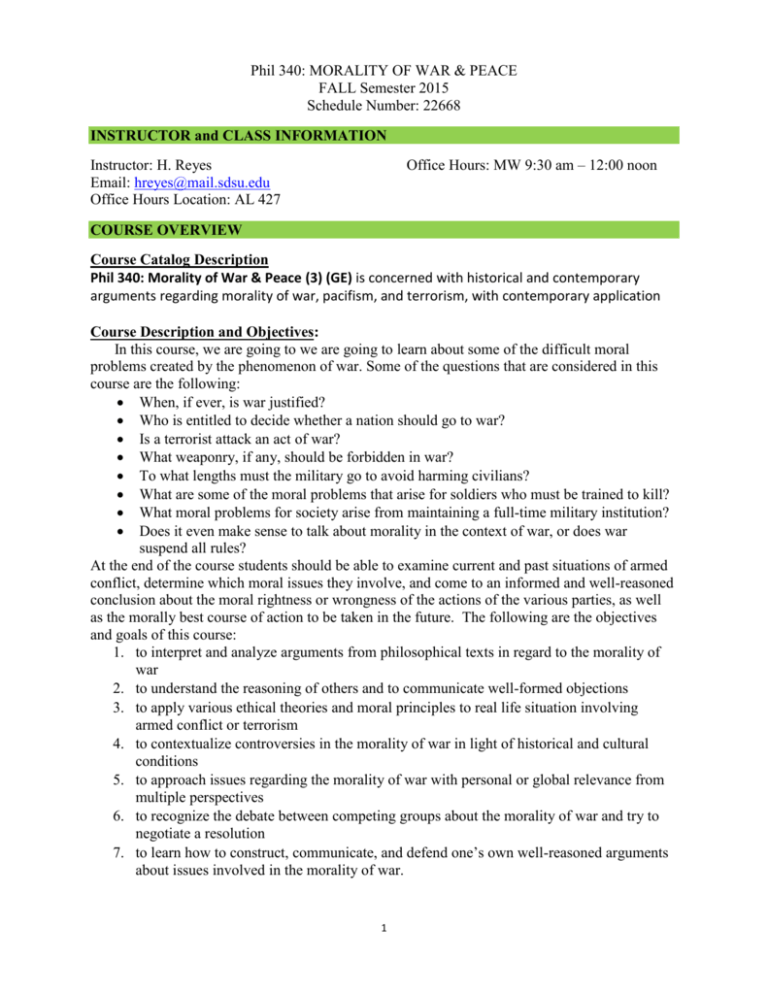
Phil 340: MORALITY OF WAR & PEACE
FALL Semester 2015
Schedule Number: 22668
INSTRUCTOR and CLASS INFORMATION
Office Hours: MW 9:30 am – 12:00 noon
Instructor: H. Reyes
Email: hreyes@mail.sdsu.edu
Office Hours Location: AL 427
COURSE OVERVIEW
Course Catalog Description
Phil 340: Morality of War & Peace (3) (GE) is concerned with historical and contemporary
arguments regarding morality of war, pacifism, and terrorism, with contemporary application
Course Description and Objectives:
In this course, we are going to we are going to learn about some of the difficult moral
problems created by the phenomenon of war. Some of the questions that are considered in this
course are the following:
When, if ever, is war justified?
Who is entitled to decide whether a nation should go to war?
Is a terrorist attack an act of war?
What weaponry, if any, should be forbidden in war?
To what lengths must the military go to avoid harming civilians?
What are some of the moral problems that arise for soldiers who must be trained to kill?
What moral problems for society arise from maintaining a full-time military institution?
Does it even make sense to talk about morality in the context of war, or does war
suspend all rules?
At the end of the course students should be able to examine current and past situations of armed
conflict, determine which moral issues they involve, and come to an informed and well-reasoned
conclusion about the moral rightness or wrongness of the actions of the various parties, as well
as the morally best course of action to be taken in the future. The following are the objectives
and goals of this course:
1. to interpret and analyze arguments from philosophical texts in regard to the morality of
war
2. to understand the reasoning of others and to communicate well-formed objections
3. to apply various ethical theories and moral principles to real life situation involving
armed conflict or terrorism
4. to contextualize controversies in the morality of war in light of historical and cultural
conditions
5. to approach issues regarding the morality of war with personal or global relevance from
multiple perspectives
6. to recognize the debate between competing groups about the morality of war and try to
negotiate a resolution
7. to learn how to construct, communicate, and defend one’s own well-reasoned arguments
about issues involved in the morality of war.
1
General Education (GE) Outcomes:
Philosophy 340 is an upper division course which fulfills General Education section IV,
Explorations of Human Experience. Courses in this area must not be taken sooner than the
semester in which a student achieves upper division standing (60 units passed). Upper division
courses in the major department may not be used to satisfy General Education section IV,
Explorations of Human Experience. Courses in a student’s major (collaborative, cross-listed,
“Same course as”) may not be used in Section IV, Explorations of Human Experience.
Philosophy 340 is aimed at “providing the breadth of knowledge necessary for meaningful
work, life-long learning, socially responsible citizenship, and intellectual development. Through
this course, “students gain intellectual and practical skills such as inquiry and analysis, creative
and critical thinking, written and oral communication, etc.”
Among the “seven essential
capacities” emphasized by San Diego State’s General Education program, Philosophy 340
develops in students these abilities:
1.
2.
3.
4.
5.
6.
7.
Construct, analyze, and communicate arguments
Apply theoretical models to the real world
Contextualize phenomena
Negotiate differences
Integrate global and local perspectives
Illustrate relevance of concepts across boundaries
Evaluate consequences of actions.
Specific Learning Goals:
This upper division GE course fulfills the goals for GE Courses in the Humanities and Fine
Arts. In particular, Philosophy 340 will promote student’s understanding of “human problems,
responsibilities and possibilities in changing historical contexts and diverse cultures.” Students
will gain the ability to identify and to evaluate belief systems and values. Students will acquire
“capacities for reflection, critique, communication, [and] cultural understanding.” Upon
completing this area of Foundations, students will be able to:
Goal 1: Analyze written, visual, or performed texts in the humanities and fine arts with
sensitivity to their diverse cultural contexts and historical moments.
Goal 2: Develop a familiarity with various aesthetic and other value systems and the
ways they are communicated across time and cultures.
Goal 3: Argue from multiple perspectives about issues in the humanities that have
personal and global relevance.
Goal 4: Demonstrate the ability to approach complex problems and ask complex
questions drawing upon knowledge of the humanities.
ENROLLMENT OVERVIEW
Prerequisites: Completion of the General Education requirement in Foundations of Learning
II.C., Humanities. Also, to satisfy upper division GE requirement, student should have upper
division standing. Phil 101 (Intro to Ethics) is recommended, but not required. Deadline to add,
drop or change grading basis: September 4, 2015 (11:59 pm)
2
COURSE MATERIALS
REQUIRED TEXT: Christopher, Paul. (2004). The Ethics of War & Peace: An Introduction to
Legal and Moral Issues (3rd edition). Pearson/Prentice Hall. (ISBN: 0-13-092383-4)
COURSE STRUCTURE and CONDUCT
Our course is a fully online class. As such, it offers the advantage of learning anyplace and
anytime. However, despite this flexibility, in order to be successful in the online course students
should keep in mind the following requirements:
1. A computer - PC or Macintosh- with a stable Internet connection. Higher speed Internet
connections (cable modem, DSL) are strongly recommended.
2. Basic computer skills - email, surf the Internet, and create basic word processor files.
3. Microsoft Office 2010, or higher (Must include Word and PowerPoint).
4. Complete readings and assignments by the dates indicated on the syllabus. Time
management is very important for online classes. Distance learning courses require as
much time as traditional classroom instruction. The primary difference is that online
instruction allows flexibility. Procrastinators are rarely successful in distance learning
courses.
5. Check email and Blackboard announcement page on a daily basis.
Please Note The Following:
1. To see whether you meet the distance learning prerequisites, please take SDSU’s
“readiness survey” at https://sunspot.sdsu.edu/pls/webapp/survey.hybrid_learning.main
2. Download Mozilla’s Firefox is recommended (however, some students claim that Safari
or Chrome work better for them).
3. Download (for free) all necessary software, including the latest versions of: Adobe’s
Acrobat Reader and Flash Player, QuickTime Player, and Java.
4. Have a backup plan for fulfilling course obligations when/if your computer
malfunctions. For example, to find out about computers at the library; go to
http://scc.sdsu.edu/home.php.
5. If you need to learn how to use Blackboard, go to: http://its.sdsu.edu/blackboard/student/
6. Re: Technology -- The instructor cannot provide IT support. You are responsible for
your computing needs. When problems occur on the SDSU end (blackboard crash, our
clerical errors), you will not be penalized. However, when problems occur on your end,
you must fix them prior to any deadlines. Student IT problems are not an acceptable
excuse for non-completion of work. You can go to Student Computing Center in Love
Library for help or to use their computers; call (619) 594-3189; email
scc@rohan.sdsu.edu; or click http://scc.sdsu.edu/home.php.
COURSE ASSESSMENT AND GRADING
COURSE REQUIREMENTS:
The following are the different types of requirements you will complete in this course:
3
READINGS:
You are expected to do all the assigned readings. This includes the e-lectures (posted on
Blackboard), the readings assigned from your textbook, and other materials that may be posted
on the course document section of Blackboard for each week. Every week, there is a Blackboard
announcement, and this announcement will inform you of the readings and class work that you
need to do for that week. That is why you must make it a practice to login to Blackboard every
Monday to find out about the announcement for the week.
ONLINE DISCUSSION BOARD (ODB):
For each Online Discussion Board assignment you are to post your answers to the discussion
board questions on the Discussion Board section of Blackboard. The average grade of all the
responses to the discussion board will be 40% of your final grade.
Please remember that the Discussion Board is not a chat room. Responses and replies should be
thoughtful, considerate and must use college-level language and grammar. Carefully proof-read
your response to the discussion board questions for correctness in grammar, spelling, use of
punctuation marks, etc. before submitting your response. Each ODB is worth 10 points.
NOTE: You must follow the specific requirements as to the due date for the
posting of your discussion board response as well as for other things you will be
asked to do in regard to each discussion board.
QUIZZES:
For each chapter there will be a quiz that involves answering short questions based on the
material covered in each chapter of the text. This is primarily intended to ensure that you become
familiar with the critical concepts and issues covered in each chapter. Each quiz is worth 10
points.
MAJOR EXAMS:
There will be a major exam upon completion of each module. These major exams will consist of
essay questions that you will need to answer as clearly and thoroughly as possible. These major
exams will be based on the e-lectures and readings done for a given period of the course. Again,
the specifics about these major exams will be provided in the Blackboard announcement. Each
major exam is worth 100 points.
GRADING POLICY:
Your final grade will be based on the following distribution of points:
500-------------------- 5 Major Exams
110 --------------------11 Quizzes
4
110-------------------- 11 ODBs
720 TOTAL POINTS
Your final letter grade will be based upon the following scale:
670– 720 ---------- A
400 – 449----------- C+
610--669----------- A350 – 399----------- C
550 – 609----------- B+
300 – 349----------- C500 – 549----------- B
250 – 299----------- D+
450 – 499----------- B200 – 249----------- D
Anything below 200 is an F.
STUDENT DISABILITY SERVICES & RELIGIOUS OBSERVANCES
Student Disability Services
If you are a student with a disability and believe you will need accommodations for this class, it
is your responsibility to contact Student Disability Services at (619) 594-6473. To avoid any
delay in the receipt of your accommodations, you should contact Student Disability Services as
soon as possible. Please note that accommodations are not retroactive, and that accommodations
based upon disability cannot be provided until you have presented your instructor with an
accommodation letter from Student Disability Services. Your cooperation is appreciated.
The CSU Office of the Chancellor defines a learning disability as “... a generic term that refers to
the heterogeneous group of disorders manifested by significant difficulties in the acquisition and
use of listening, speaking, reading, writing, reasoning or mathematical abilities. These disorders
occur in persons of average to very superior intelligence and are presumed to be due to central
nervous system dysfunction. Even though a learning disability may exist concomitantly with
other handicapping conditions (e.g., sensory impairments) or environmental influences (e.g.,
cultural/language difficulties), it is not the direct result of these conditions or influences.” If you
think something might prevent you from doing well in this course, you should discuss this with
me so that proper arrangements may be made to accommodate your needs.
Religious Observances
By the end of the first week of classes, students should notify the instructor of planned absences
for religious observances. They must inform faculty members within the first week in order to
be excused from scheduled tasks on scheduled days.
ACADEMIC HONESTY
The University adheres to a strict policy regarding cheating and plagiarism. These activities will
not be tolerated in this class. Become familiar with the policy
(http://www.sa.sdsu.edu/srr/conduct1.html). Any cheating or plagiarism will result in failing this
class and a disciplinary review by Student Affairs.
Examples of Plagiarism include but are not limited to:
Using sources verbatim or paraphrasing without giving proper attribution (this can
include phrases, sentences, paragraphs and/or pages of work)
Copying and pasting work from an online or offline source directly and calling it your
own
5
Using information you find from an online or offline source without giving the author
credit
Replacing words or phrases from another source and inserting your own words or phrases
Submitting a piece of work you did for one class to another class
If you have questions on what is plagiarism, please consult the policy
(http://www.sa.sdsu.edu/srr/conduct1.html) and this helpful guide from the Library:(
http://infodome.sdsu.edu/infolit/exploratorium/Standard_5/plagiarism.pdf)
COURSE OUTLINE/SCHEDULE
#1 – Week of 08/24/15: Introduction to philosophy in general and to ethics in particular
TO DO:
Read Lecture 1.1 (posted on Blackboard)
Read Lecture 1.2 (posted on Blackboard)
ODB #1 DUE: Friday, 08/28/15 (11 pm)
MODULE #1: The Just War Tradition
#2 – Week of 08/31/15: Just War in Antiquity and Christianity and the Tradition of Just
War
TO DO:
Read chapters 1 and 2
QUIZ #2 DUE: Sunday, 09/06/15
#3 – Week of 09/08/15: St Augustine and Secularization of Tradition of Just War
TO DO:
Read chapters 3 and 4
ODB #2 DUE: Friday, 09/11/15 (11 pm)
MAJOR EXAM #1 DUE: Sunday, 09/13/15 (11 pm)
MODULE #2: The Legal Position of War
#4 – Week of 09/14/15: Hugo Grotius and the Just War
TO DO:
Read chapters 5 and 6
ODB #3 DUE: Friday, 09/18/15 (11 pm)
QUIZ #3 DUE: Sunday, 09/20/15 (11 pm)
6
#5 – Week of 09/21/15 and #6: Week of 09/28/15 Problems for International Law
TO DO:
Read chapter 7
ODB #4 DUE: Friday, 09/25/15 (11pm)
QUIZ #4 DUE: Sunday, 09/27/15 (11 pm)
MAJOR EXAM #2 DUE: Sunday, 10/04/15 (11 pm)
MODULE #3: Moral Issues in War (part 1)
#7 – Week of 10/05/15: The Responsibility for War Crimes
TO DO:
Read chapter 8
ODB #5 DUE: Friday, 10/09/15 (11 pm)
QUIZ #5 DUE: Sunday, 10/11/15 (11 pm)
#8 – Week of 10/12/15: Military Necessity
TO DO:
Read chapter 9
ODB #6 DUE: Friday, 10/16/15 (11 pm)
QUIZ #6 DUE: Sunday, 10/18/15 (11 pm)
#9 – Week of 10/19/15: Reprisals
TO DO:
Read chapter 10
ODB #7 DUE: Friday, 10/23/15 (11 pm)
MAJOR EXAM #3 DUE: Sunday, 10/25/15 (11 pm)
MODULE #4: Moral Issues in War (part 2)
#10 – Week of 10/26/15: Terrorism and War
TO DO:
Read chapter 11
ODB #8 DUE: Friday, 10/30/15 (11 pm)
QUIZ #7 DUE: Sunday, 11/01/15 (11 pm)
#11: Week of 11/02/15: The Just War and Weapons of Mass Destruction
TO DO:
Read chapter 12
QUIZ #8 DUE: Friday, 11/06/15 (11 pm)
MAJOR EXAM #4 DUE: Sunday, 11/08/15 (11 pm)
7
MODULE #5: Professional and Humanitarian Obligations
#12 —Week of 11/09/15: The Enemy: Cold-Blooded Killers or Comrades in Arms?
TO DO:
Read chapter 13
ODB #9 DUE: Friday, 11/13/15 (11 pm)
QUIZ #9 DUE: Sunday, 11/15/15 (11 pm)
#13 – Week of 11/16/15: Unjust Wars and Professional Obligations
TO DO:
Rea chapter 14
ODB #10 DUE: Friday, 11/20/15 (11pm)
QUIZ #10 DUE: Sunday, 11/22/15 (11 pm)
WEEK OF 11/23/15 – THANKSGIVING BREAK (NO CLASS)
#14 – Week of 11/30/15: The Role of the United Nations
TO DO:
Read chapter 14
ODB #11 DUE: Friday, 12/04/15 (11 pm)
QUIZ #11 DUE: Sunday, 12/06/15 (11 pm)
MAJOR EXAM #5 DUE: Thursday, 12/10/15 (11 pm)
8

